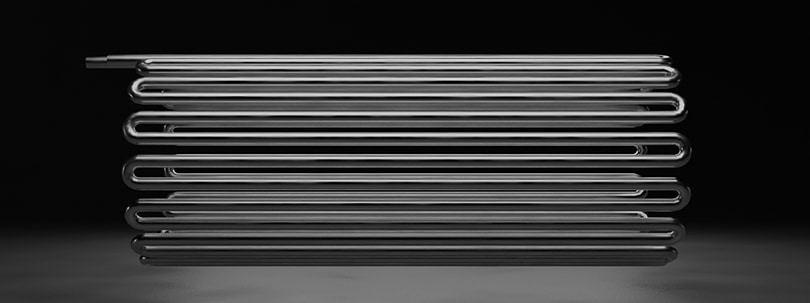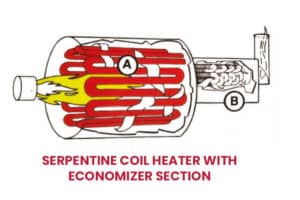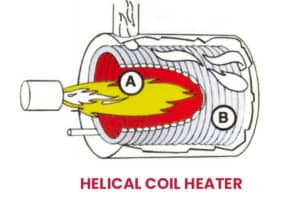When it comes to industrial hot oil heaters and thermal fluid heaters, there are many options and varieties to choose from. With so many options, the process of determining which heating product or system is most appropriate for your business can feel daunting.
The Enerquip experts are here to make that process easier for you. We’ll highlight exactly what sets our thermal fluid heaters apart from the rest, along with creating a solution that fits your needs.

Enerquip’s Serpentine Coil
Thermal Fluid Heater Coils
Most industrial heating equipment manufacturers solely produce thermal fluid heaters that feature helical heating coils. While we do produce helical coil thermal fluid heaters for clients in need of this specific type of equipment, the majority of thermal fluid heaters we produce feature serpentine coil technology. In fact, our standard thermal fluid heaters are designed and equipped with the more efficient, durable serpentine coil technology.
While helical coil heaters feature helically wound coils, our serpentine coil heaters feature serpentine radiant coil bundles. The difference between the two coil types can be seen in the cross-section images below.
Serpentine Coil Heat Exchange
In the radiant section of the heater (A), heat is transferred to the front, sides and back of the serpentine coil. This allows for more even heat distribution, less coil degradation, longer tube life, and higher operating oil temperatures. In the convection section (B) of our serpentine coil, heat is transferred to a much larger surface area in our integrated economizer. This reduces stack temperature and makes the serpentine coil hot oil heater 10-15% more efficient.

Helical Coil Heat Exchange
In the radiant section of the heater (A), heat is transferred by direct radiation only on the inside surface of the helical coil. Convection (B) only occurs as the vapors pass over the outside surface of the helically wound coils, before leaving the stack at a much higher temperature. Although less efficient, this design is more compact. These, and other, factors set serpentine coil thermal fluid heaters apart from typical hot oil heaters and enable them to provide a number of benefits.
Benefits of Serpentine Coil Heater Design
Hot oil heaters that feature serpentine coils offer a number of advantages over conventional hot oil heaters, including:
Higher Efficiency: Serpentine coil heaters are 10 to 15% more efficient than hot oil heaters that feature helical coils. As an example, when switching from a helical to a serpentine coil thermal fluid heater with a maximum load of 2MM Btu/hr, the fuel cost savings per year can be upwards of $270,000. The fuel savings in one to two years will pay for the equipment itself!
Low Level of Fluid Degradation: Heating fluid lasts longer when utilized with a serpentine coil heater.
Higher Operating Temperatures: Typical hot oil heaters offer limited operation at fluid temperatures over 400°F, but serpentine coil hot oil heaters can operate efficiently at temperatures up to 650°F.
Long Tube Life: Tube failures are common in hot oil heaters featuring helical coils. Serpentine coils typically last two to three times longer than standard helical coils. As a result, it’s not uncommon for Enerquip’s serpentine coil heaters to last 30 years!
Easy Maintenance: For the rare times when maintenance is required, Enerquip’s serpentine coil can be removed, repaired or replaced, typically in less than one day. Learn more about how serpentine coil heater repairs differ from helical coil heater repairs.
Serpentine Coil Thermal Fluid Heaters from Enerquip
Have questions specific to your industry or application? Give us a call today at (715) 748-5888 or contact us online to learn more about our hot oil heaters and the other industrial heating products we offer.
Want to know what it would cost to implement one of our thermal fluid heating systems in your plant? Request a quote today!
More from the Enerquip Blog
Thermal Fluid Heaters from Enerquip [Videos]
Mechanical Reasons to Choose a Serpentine Coil Heater Over a Helical Coil Heater
Thermal Fluid Heater Repairs: Helical Coil Heaters vs. Serpentine Coil Heaters
